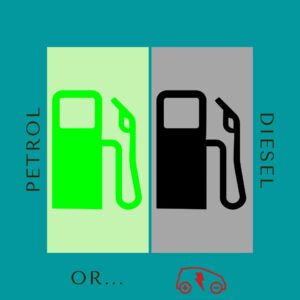I started dog walking after being made redundant and the vehicle I had at the time was a Vauxhall Tigra. In case you were in any doubt, a small sports car is not the best dog walking van 🙂
Unless most of your clients live within a 15 minute walking radius of your home (see how to be a dog walker without a vehicle here) then you’re probably looking for the best type of vehicle for your needs.
If you’re wondering if you need a van or if you can get away with the car you have, see our ‘do I need a van’ article for more information.
But once you’ve decided on a type of vehicle, your next decision is going to be electric, diesel or petrol.
For anyone who only drives very short distances, they may want to consider an electric or hybrid vehicle instead of a petrol or diesel vehicle.
This is because electric and hybrid vehicles are typically more efficient in stop-and-go traffic and can save on fuel costs in the long run. Additionally, electric vehicles produce zero emissions, which can help reduce environmental impact.
For this article, we’re going to take a look at diesel and petrol differences.
TLDR: Buy a petrol car or van.
If electric isn’t your thing (or in your budget) and if you only drive very short distances, a petrol vehicle may be more suitable for you than a diesel vehicle.
This is because diesel engines are typically less efficient at low speeds and can suffer from issues such as clogged diesel particulate filters if they are not driven for long enough distances.
However, it’s important to note that petrol vehicles can also be less efficient in stop-and-go traffic, so you may want to consider a smaller engine size or a hybrid petrol-electric vehicle if fuel efficiency is a concern.
Diesel engines can be less suitable for short distance driving for a few reasons:
- Diesel engines typically require a certain operating temperature to function efficiently, and short trips may not provide enough time for the engine to warm up to this temperature. As a result, the engine may not be able to burn fuel as efficiently, which can lead to reduced fuel economy, increased emissions, and potentially other issues such as premature wear and tear.
- Diesel engines can also be more prone to issues with the diesel particulate filter (DPF), which is designed to capture harmful particles in the exhaust. If the engine does not reach a sufficient operating temperature for long enough periods of time, the DPF may not be able to regenerate properly, which can lead to clogging and potentially expensive repairs.
Overall, while diesel engines can offer good fuel economy and durability, they may not be the best choice for someone who only drives short distances. In such cases, a petrol engine or an alternative-fuel vehicle such as a hybrid or electric may be a better option.
Petrol engines can be more suitable for short distance driving for a few reasons:
- Petrol engines typically warm up faster than diesel engines, which can make them more efficient for short trips where the engine may not have time to reach full operating temperature. This can help improve fuel economy and reduce emissions.
- Petrol engines are generally less complex than diesel engines and have fewer emissions control systems that require a certain operating temperature to function properly. This means that petrol engines may be less prone to issues such as clogged particulate filters or other emissions control problems when used for short distance driving.
- Petrol engines can also be better suited to stop-and-go driving, which is common in urban environments and short distance trips. Petrol engines generally have more responsive throttle control and can provide better acceleration and low-speed performance than diesel engines, which can make them more comfortable and convenient to drive in these conditions.
Overall, while petrol engines may not be as fuel-efficient as diesel engines for long distance driving, they can offer advantages for short distance driving in terms of efficiency, emissions, and driving performance.
Want to check the latest fuel prices? https://www.fleetnews.co.uk/costs/fuel-prices/
Trying to save fuel? Check out our fuel saving tips here.
| Petrol Engine Pros | Petrol Engine Cons | Diesel Engine Pros | Diesel Engine Cons | |
|---|---|---|---|---|
| Efficiency | Good for short trips | Lower fuel economy than diesel | Good for long trips | Lower efficiency for short trips |
| Cost | Typically cheaper to buy | Higher fuel costs than diesel | Higher resale value | Higher upfront cost and maintenance costs |
| Performance | Better acceleration and low-speed performance | Less torque at low RPMs | More torque at low RPMs | Slower acceleration and lower top speeds |
| Emissions | Lower emissions of NOx | Higher emissions of CO2 | Lower emissions of CO2 and potentially lower NOx | Higher emissions of particulate matter and potentially higher NOx |
| Maintenance | Generally simpler and easier to maintain | May require more frequent oil changes | Longer-lasting and more durable | More complex emissions control systems and potential DPF issues |
AFFILIATE DISCLAIMER
The dog walking coach website is supported by our visitors. Some of the product links on this website are through affiliate schemes such as Amazon. This means that I earn a small commission if you choose to purchase something at no extra cost to yourself.
